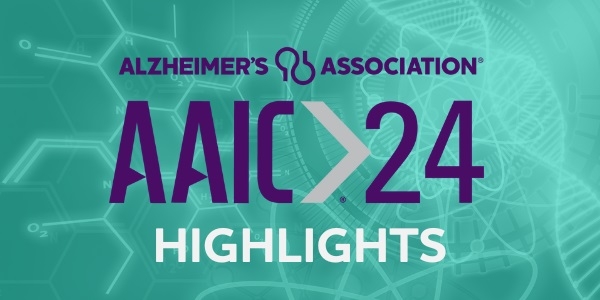Highlights of the 2024 Alzheimer’s Association International Conference (AAIC)
Alzheimer's Association, Alz MindFL
By Stefanie Wardlow and Keith Gibson, August 4, 2024
The recent week in Philadelphia was marked by excitement as the Alzheimer’s Association International Conference (AAIC) unfolded. Drawing over 14,000 attendees, the event provided a platform for renowned figures, emerging researchers, and experts in the Alzheimer’s and dementia field to exchange insights. The breakthroughs unveiled at AAIC promise to deepen our understanding of the disease, advancing progress towards innovative treatments, preventative strategies, and the ultimate goal of finding a cure.
Stefanie Wardlow’s Highlights:
LEADS
The Longitudinal Early-Onset AD Study (LEADS) funded by the National Institute on Aging (NIA) aims to bridge gaps in Alzheimer’s disease and related dementias research. The LEADS study aims to recruit and track 500 cognitively impaired individuals and 100 cognitively normal participants aged 40-64 across about 15 locations in the United States, including two sites in Florida.: Mayo Clinic, Jacksonville, 4500 San Pablo Rd S, Jacksonville, FL 32224 (Gregory Day, MD); Wein Center of Clinical Research, 4302 Alton Rd #2040, Miami Beach, FL 33140 (Ranjan Duara, MD) LEADS will evaluate clinical, cognitive, imaging, biomarker, and genetic traits. Learn More. Join the Fight.
Evoke and Evoke Plus
Evoke and Evoke Plus are two double-blind, placebo-controlled trials, with expected report outs in 2025. These phase 3 world wide studies assess the efficacy and safety of oral semaglutide in individuals with early Alzheimer’s disease. Semaglutide, a glucagon-like peptide-1 receptor agonist (GLP-1) has shown promise in reducing cognitive decline and inflammation based on preclinical studies and real-world data.
Semaglutide is undergoing repurposing, meaning it has U.S. Food and Drug Administration approval for other conditions.
The Evoke and Evoke Plus studies have met study enrollment and have similar designs but are classified separately due to the inclusion of cerebral vascular changes in the latter. If the Evoke trial shows benefits of oral semaglutide in reducing cognitive decline in early Alzheimer’s, it could offer a new treatment approach for patients.
Note a phase 2b study of another GLP-1 (liraglutide) was reported on at AAIC.
Music and the Brain
Aaron Colverson showcased his ability to harmoniously combine his love for music with his dedication to studying dementia. He seeks to better understand the connection between music and the brain. He plays “Stars and Stripes Forever” by John Philip Sousa in the clip below.
Keith Gibson’s Highlights:
Guiding an Improved Dementia Experience (GUIDE) Model
In an effort to address this need, in 2023, the Centers for Medicare & Medicaid Services (CMS) announced the Guiding an Improved Dementia Experience (GUIDE) Model, an alternative payment model aimed at improving quality care and support for people living with dementia and unpaid caregivers. The model presents a comprehensive framework for improving dementia care practices including person-centered care plans, care coordination, 24/7 access to a support line, as well as education, training, and respite services for unpaid caregivers. This session reviewed the inception and development of the GUIDE Model, discuss implementation plans from selected GUIDE participants, and provide an overview of the key components of the evaluation plan.
Recruitment for Alzheimer’s Studies in LMICs: Challenges and Opportunities for Engagement of High-Risk Populations
This session addressed the urgent issue of Alzheimer’s disease and related dementias (ADRD) within Low- and Middle-Income Countries (LMICs), focusing on the recruitment of high-risk populations into clinical trials. The discussion highlighted various challenges and barriers in this context, including socioeconomic factors, educational disparities, and limitations in healthcare infrastructure.
The presentations detailed innovative strategies for engaging and recruiting participants, stressing the need for culturally and regionally tailored approaches. Success stories from studies established in LMICs, particularly those under the World-Wide FINGERS initiative like LatAm FINGERS and MIND CHINA in Latin America and China, were showcased. The READD-ADSP Kenya project presented strategies that have effectively mitigated recruitment hurdles by diminishing stigma, consequently fostering more positive public perceptions and attitudes toward dementia treatment and care. The PROAME trial highlighted the inclusion of underrepresented groups by targeting low-educated adults within a Brazilian literacy program, which demonstrated beneficial cognitive outcomes.
Overall, this session not only shed light on the obstacles faced in LMICs but also offered a platform to share successful models and opportunities that could pave the way for more effective Alzheimer’s disease research and interventions among high-risk populations.
Centenarians
The 100-plus Study, led by Henne Holstege, Amsterdam UMC, Netherlands, is an on-going prospective cohort study of Dutch centenarians (who self-reported to be cognitively healthy), their first-degree family members and their respective partners. This study identified that centenarians presented like 80 – 85 year olds. This was based on the following:
Centenarians resisted the accumulation of the microtubule binding region of MAPT (MBTR-MAPT).
Centenarians with highly cognitive performance resisted the accumulation of Amyloid loads.
Based on the abundance of key proteins, centenarians are decades younger. Therefore, the characteristics were associated with the escape or delay of cognitive decline.
Each year, AAIC convenes researchers, clinicians and dementia professionals from all career stages to share breaking research discoveries that will lead to methods of prevention and treatment and improvements in diagnosis for Alzheimer’s disease. From basic science to dementia care, every aspect of the field’s growing knowledge of dementia is incorporated into this world-class conference.
